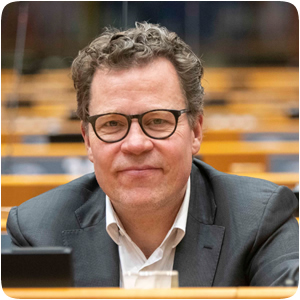 In the fall 2014, I was shadow rapporteur on a report on energy security, which at the time was a hot topic in the European Parliament. It was shortly after the Russian annexation of Crimea, and while working on the report it made a big impression on me, just how scared of Russia's Vladimir Putin all my Eastern European colleagues in the European Parliament were.
In the fall 2014, I was shadow rapporteur on a report on energy security, which at the time was a hot topic in the European Parliament. It was shortly after the Russian annexation of Crimea, and while working on the report it made a big impression on me, just how scared of Russia's Vladimir Putin all my Eastern European colleagues in the European Parliament were.
For those of us living at relative distance to Russia, it was perhaps easier to brush off the threat from Russia, as some irrelevant leftover from The Cold War, but for neighbour countries, the threat was serious indeed. Today, everybody realises the fear of Putin was well-founded. Indeed, that was also the conclusion of the report we issued shortly after: energy policy is security policy, and Europe's dependence on Russian fossil fuels can become a security threat to the European Union. Then, as well as now, the answer to the security threat from Russia is the Energy Union.
Back in 2014, the creation of a brand new European energy union was the most important and highly prioritised project for the European Commission. On paper the Energy Union is about mitigating climate change, and create an internal market where energy can flow freely across Europe's borders. However, the Energy Union is also about security policy, geopolitics, and high-level foreign relations.
Clean energy is amongst the most fundamental tools in European security policy, and the math is rather clear. While the EU currently is dependent on oil and gas from Russia, the Russian economy is equally dependent on the European market. In a way, this offers an explanation to Putin’s aggression: if he was ever to utilise Europe's dependence on Russian fossil energy as security politics, it had to be sooner rather than later, before the value of fossil fuels would disappear entirely with the emergence of the European Energy Union.
Seemingly, Vladimir Putin was in fact willing to give up the Russian economy in order for him to fulfil his imperialistic ambitions. Or perhaps he simply miscalculated the situation, and banked on a quick invasion of Ukraine, while all of Europe would argue internally over refugees. Whatever reasoning were behind Putin's aggression in Ukraine, Europe still faces that original threat of Putin shutting off the energy supplies from Russia to Europe.
At this point in time, however, we are past the point of no return. The war in Ukraine has created a paradigm shift in European politics - policies, which were impossible three weeks ago, are now possible. This is not least the case in energy politics because today, everybody in Europe understands that energy politics is security politics, and European politicians are ready to act on it. The recent Council meeting at Versailles confirmed that member states are in the same boat as the Commission and the Parliament. The European unity has been quite remarkable, and there is no doubt the green energy transition will pick up steam now and accelerate quicker than anticipated. After all, a war in Europe offers much more proximity than some distant future with higher temperature.
In any case, it spells the end of Europe's dependence on Russian fossil energy, the only question left is how quickly it can be done. I am a keen proponent of an established end-date in 2027. This implies short, medium and long-term planning and evaluations, and such an ambitious time limit will help to ensure that no opportunities to introduce clean energy at the cost of fossil energy are left behind underway.
We cannot live with the fact that Europe's dependence on Russian oil and gas sponsors Putin's war machine in wars designed to bring evolving democracies straight back into the Dark Ages. Consequently, Europe must seize the moment and plan the road to energy independence, even if it comes at a price for European citizens and businesses. I think we are beyond the point of imagining the current crisis will be free of costs, in fact Putin's refusal to fill up Europe's gas reserves already drove European energy prices through the roof months ago, and is just another reminder of why we must be energy independent from Russia as soon as possible. The long-term answer to the short-term challenges remains the establishing of the European Energy Union.
The next few weeks will provide us with more answers about concrete measures to set Europe free of Russian energy supplies, but there are obvious areas to address. The slow deployment of renewables is of particular concern to me. We also have to make sure the electricity grid is suited for a quicker energy transition, address energy efficiency, install more heat pumps, boost European biogas production, and much more.
On the positive side, the window is open for progressive, green policies right now. Europe will seize the moment and go green faster than expected while opposing tyranny and defending democratic values in the process. Even if this happens in the shadows of a terrible war, it is exactly what Europe should stand for, and what I want to fight for.